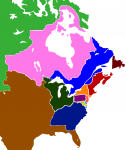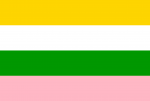a Successful Armada of 1779 allows the French, Spanish, and Americans, to dictate terms to the British. Unfortunately for the Americans, the lord giveth and he taketh away. In this case, efforts to reform the articles of confederation fall through. oops.

Far to the Northwest lays swathes of unexplored territory. Well, unexplored by westerners. Plenty of Native groups have lived there for generations. Some overlapping claims, including by the Russians, still poking at the edges of Alaska.
Much of the west falls under the power of Spain. New Spain has been New Spain since the fall of the Aztecs, and now stretches from San Francisco into the jungles of Central America. After the Seven Years War, France was forced to hand over Louisiana, which the Spanish happily took, granting them a stranglehold over the Great Mississippi River. And, after the recent war, Britain has been forced to cede Florida back to Spain. The Gulf is, for the first time, a Mexican Lake. These areas have been fairly quickly integrated, especially compared to the troublesome Jamaicans.
In the frigid North lies the…well formerly it was the area under the control of the Hudson Bay Company. And it still is mostly, the forts and factories are still there. But the British were forced to acknowledge that other powers had a right to the fur trade, ending their monopoly. Except…they still have their monopoly? Only a few intrepid traders have shown up, and certainly no rival forts and factories.
The State of Canada. Is. Well. It’s very confused. The French Colony was conquered by the British then signed away in a Treaty. The Continental failed to conquer it but the British had to sign it away in their humiliating peace anyway. But then the Union collapsed and…now Quebec is independent? Through no fault of their own the people of Canada (or is it New France? Or Quebec?) have wound up free and independent. Well kind of free. A coalition of the landowners, merchants, and Church are running the show, desperately searching for the borders of their new state, as well as an identity.
All that remains of the once great British North America is Newfoundland. With a French Army in London the British pretty much had terms dictated to them. Newfoundland was retained to their power, although they are forced to recognize fishing rights. Some loyalists have settled here, with Loyalton (get it?) becoming a rival to St. John’s. Most, however, moved on to England or the new colonies in Australia. Just South the French fishermen of Saint Pierre and Miquelon have returned, but little more. The French have taken their prizes elsewhere.
Confederation of New England was forged by war, namely what started as a fight over Vermont escalated into a battle that drew the old Religious colonies together into a closer, but still loose, Union. It also had the side effect of killing the United States of America. Nova Scotia got forked over by the British, rather than actually joining the Colonial Rebellion. But they’re suitably English and Protestant that they were allowed to join. St. John’s Island, which will now never meet Prince Edward, also comes along. A fairly stable, open, Republic but the standards of the day. Certainly still the seafaring heart of the area.
The aforementioned scuffle over Vermont turned into a “let’s beat up New York and laugh at their misery” party. This was not fun. The upshot of this is a new state Constitution, crafted by one A. Hamilton. Strong executive, strong state power. Shut up if you don’t like it. And should the chance arise for revenge, well, New York will take it. New York City is, as one might expect, a rather large port, and the government is working to rebuild ties with the British nowadays.
New Jersey allied with New England during the “gang up on New York” power hour, and wound up on the winning side. Yay. Unfortunately the young Republic is left standing alone. The alliance with New England still holds, but it’s a small fish in a big pond. Not helping matters is some instability in the Government, and general malaise.
Pennsylvania vaguely supported the anti-New York Action. But since independence the primary issue of the Quaker State has been internal politics. Inflation has been bad. The citizenry roused to rabble. Ex-soldiers being denied pay. The political system is little better and powerful legislature and multi-man executive sounds great in theory. But, well, it’s proving less than optimal. Sooner or later something has to break. The State Militia in particular is looking at stepping in…
In the west, but not the far west, claims are a mess. Each new nation has a bunch of claims about here and there. Virginia claimed everything. Connecticut still claims to extend to the Pacific Ocean, although the Western Reserve is now cut off from the motherland. Other settlers claim no allegiance. Most observers agree that a new nation will emerge here somehow. That is, unless the old nations, the Natives, don’t take the opportunity to push back. And they are organizing…
Maryland is doing rather well for itself. A stable government. Plenty of trade, along with domestic production of export goods, mostly slave grown cash crops. Steady hands at the tiller have made Maryland the most successful of the former colonies that went it alone, after the Confederation Congress died its death. There is a faction that argues for joining the Federal Republic but keeps things cordial.
Delaware is a very small country in a big big world. It’s dominated by one party, and exists only at the whims of others. However solid diplomatic legwork, means those whims will not change soon. Despite issues with corruption, Delaware has seen prosperity since independence, largely thanks to a free trade outlook that encourages all comers to dock in their habours, which may help explain the corruption thing.
The Southern states watched with horror as the North tore itself apart, leaving them to pick up the pieces of the failed efforts to make the Articles of Confederation workable. With leadership from James Madison, they largely have, although concessions had to me made to avoid Virginian domination, which still makes the Carolinas and Georgia nervous. Has managed to secure the area west of the Appalachians and south of the Ohio, making them a prime mover in the west. Democratic…if you’re a white landowner. And since this is the South, that means slaveholders. And the death of the Union does not mean the death of the Cotton Gin…..









